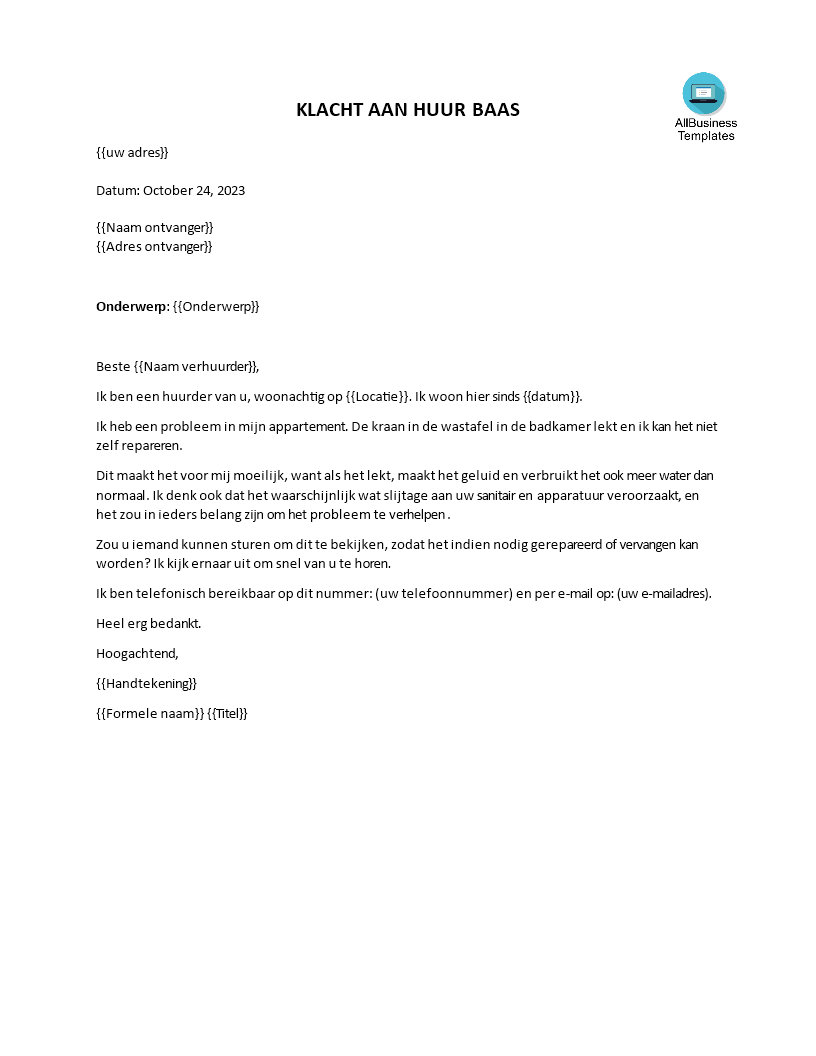Landlord Complaint Letter from Tenant
Save, fill-In The Blanks, Print, Done!

Download Landlord Complaint Letter from Tenant
Microsoft Word (.docx)Or select the format you want and we convert it for you for free:
Other languages available:
- This Document Has Been Certified by a Professional
- 100% customizable
- This is a digital download (29.61 kB)
- Language: English
- We recommend downloading this file onto your computer.
How to write a landlord complaint letter as a tenant? How to file a complaint against a housing rental company or landlord? Take a look at our sample complaint letter template. This letter outlines the facts and details of the tenant's complaint and requests that the landlord take appropriate action to resolve it. Download this sample template now!
A landlord complaint letter from a tenant is a written communication in which a tenant expresses concerns, issues, or complaints regarding their rental property to their landlord or property management. These letters are a way for tenants to formally communicate problems, request repairs, or address any other issues that affect their living conditions.
Here are some common reasons for tenants to write a landlord complaint letter:
- Maintenance and Repairs: Tenants often write complaint letters to report maintenance and repair issues, such as plumbing problems, electrical issues, heating or cooling system malfunctions, leaks, and more. They may request prompt action to address these problems.
- Pest Infestations: If a tenant discovers pests, like rodents, insects, or mold, in the rental unit, they may write a complaint letter to request pest control services or mold remediation.
- Safety Concerns: Tenants may write a letter to express concerns about safety issues, such as faulty locks, broken windows, inadequate lighting, or any other condition that poses a risk to their security.
- Lease Violations: If the landlord or property management is not upholding their end of the lease agreement, such as failing to maintain common areas or provide agreed-upon services, tenants may use a complaint letter to address these lease violations.
- Noise Complaints: Tenants may write complaint letters to report excessive noise or disturbances caused by neighbors or even construction work within or near the property.
- Unresolved Issues: In cases where a tenant has previously reported an issue but it remains unresolved, they may send a follow-up letter to remind the landlord or property manager of the problem and request action.
When writing a landlord complaint letter, consider the following tips:
- Be Clear and Specific: Describe the issue in detail, providing specific information about the problem, its location, and how it affects you as a tenant.
- Attach Evidence: If applicable, attach photos, videos, or any other evidence that can help the landlord or property manager understand the issue.
- Request a Timely Response: Politely request that the landlord address the issue promptly and provide a deadline for resolution.
- Keep a Copy: Make a copy of the letter for your records and send it via certified mail or email with a read receipt to have a record of delivery.
- Remain Courteous: Maintain a respectful and professional tone throughout the letter, even if you are frustrated or upset about the issue.
- Review Your Lease: Refer to your lease agreement and any relevant sections that pertain to the issue you are addressing. This can help bolster your argument.
The goal of a landlord complaint letter is to initiate communication and document your concerns in a way that encourages the landlord to take action and address the problem promptly. If your landlord does not respond or resolve the issue in a reasonable timeframe, you may need to explore legal options or contact local housing authorities or tenant advocacy organizations for assistance.
Download this rental housing complaint letter template now for your own benefit.
DISCLAIMER
Nothing on this site shall be considered legal advice and no attorney-client relationship is established.
Leave a Reply. If you have any questions or remarks, feel free to post them below.
Related templates
Latest templates
Latest topics
- GDPR Compliance Templates
What do you need to become GDPR compliant? Are you looking for useful GDPR document templates to make you compliant? All these compliance documents will be available to download instantly... - Google Docs Templates
How to create documents in Google Docs? We provide Google Docs compatible template and these are the reasons why it's useful to work with Google Docs... - IT Security Standards Kit
What are IT Security Standards? Check out our collection of this newly updated IT Security Kit Standard templates, including policies, controls, processes, checklists, procedures and other documents. - Letter Format
How to format a letter? Here is a brief overview of common letter formats and templates in USA and UK and get inspirited immediately! - Google Sheets Templates
How to work with Google Sheets templates? Where to download useful Google Sheets templates? Check out our samples here.
cheese

